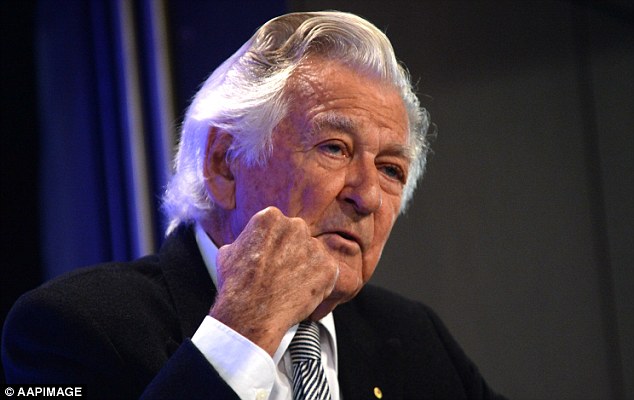IN THE MEDIA
Bob Hawke is wrong: recognising Palestine would just encourage intransigence
February 16, 2017 | Mark Leibler

Mark Leibler
Australian Financial Review – 16 February 2017
Read more (behind paywall): http://www.afr.com/opinion/columnists/bob-hawke-is-wrong-recognising-palestine-would-just-encourage-intransigence-20170215-guddgl#ixzz4YnCvfARK
Former Prime Minister Bob Hawke is correct that, as former Israeli PM Golda Meir said, there can be no peace for Israel without an honourable settlement of the aspirations of the Palestinian people. However, there can also only be peace if both parties negotiate that honourable settlement in good faith, and are prepared to make the painful compromises required.
For Israel, as shown by past offers, these compromises involve giving up the equivalent of the whole of the West Bank and Gaza, giving up some control of its capital Jerusalem and taking some risks with its security. For the Palestinians, these involve genuinely accepting Israel’s right to exist, accepting that a peace agreement will mean the end of all claims against Israel and, perhaps most importantly, accepting that seeking to overrun Israel by demanding a “right of return” for five million descendants of refugees is not compatible with a two state peace.
Israel offered the requisite concessions in 2000, 2001 and 2008, but the Palestinian leadership refused, without even offering counter-proposals. In 2009, at President Obama’s urging, Israeli PM Benjamin Netanyahu instituted an unprecedented 10-month freeze on building in settlements, to encourage peace talks, but Palestinian President Mahmoud Abbas refused to talk. In 2014, according to US mediator Martin Indyk, Netanyahu was “sweating bullets” for an agreement but Abbas just walked away. Since then, Netanyahu has repeatedly offered to negotiate without preconditions, but Abbas has refused. Instead of good faith negotiations, the Palestinian Authority has pursued a path of vicious anti-Israel incitement, endorsement of terrorism and delegitimisation of Israel.
Encouraging intransigence
In the face of such Palestinian intransigence, conferring unilateral premature diplomatic recognition, as Hawke proposes, is not only unhelpful, it is counter-productive. It will only reward, and thus encourage, further Palestinian intransigence.
Mr Hawke was well regarded as a friend of Israel, but now repeats myths often used by those who would go so far as to deny Israel’s right to exist. For example, he claims that, at partition, Jews owned less than six per cent of the land, with Palestinians owning the other 94 per cent. In fact, while Jews did own around six per cent, the Arabs there owned only a little more, with the rest being unowned – the equivalent of Crown land. The partition gave the Jews only the areas with a Jewish majority population, and it would have stayed that way had not the local Arabs and Israel’s Arab neighbours invaded with the intention of destroying the Jewish state at birth.
Similarly, Hawke’s claim that settlements are the main obstacle to peace, while commonly heard, is demonstrably untrue. There was no peace prior to 1967, when Israel had no settlements. Now, Israel’s settlements only occupy 1.7 per cent of the West Bank land, as even Palestinian Chief Negotiator Saeb Erekat has acknowledged. Israel has built no new settlements since 1999 and existing settlements have hardly expanded beyond their geographical boundaries since 2003. Most settlers live in areas it has been generally accepted for over 20 years Israel will retain as part of land swaps in any peace agreement. This is also the case for the recently announced 2500 new housing units – not new settlements as Hawke inaccurately describes them.
In fact, contrary to Hawke’s implications, settlement growth under Netanyahu has occurred at a slower rate than under his three predecessors, Ehud Olmert, Ariel Sharon and Ehud Barak, who were all regarded as more inclined to seeking peace.
Settlement growth has slowed
When offered peace with Egypt in 1979, Israel withdrew all its settlements from Sinai. In 2005, as a unilateral peace initiative, Israel withdrew all settlers from Gaza, turning over rule of the area to the Palestinians. But instead of a peaceful neighbour, Israel has received over ten thousand rockets and mortars, and terror tunnels.
Ever since United Nations Security Council Resolution 242 in 1967, the prescription for peace has been for Israel to cede land it took in its defensive Six Day War, in exchange for genuine recognition and peace, with the exact borders to be negotiated between the sides. In the 1993 Oslo Accords, it was universally agreed that these borders and all other issues could only be determined by direct negotiations.
Yet UN Resolution 2334, cited so approvingly by Hawke, goes so far as to state that the Israeli presence anywhere beyond the 1949 ceasefire lines, including even the Jewish Quarter of the Old City of Jerusalem, “has no legal validity and constitutes a flagrant violation under international law”, even though there were ancient Jewish communities in many of these areas prior to the Jordanian army driving all the Jews out in 1948. Australia’s current government is to be warmly commended for its statements distancing itself from this counterproductive resolution.
It has been Palestinian intransigence, not settlements, that has consistently stymied peace initiatives. Therefore, for there to be any chance of a resolution, the international community must make clear to the Palestinians that they will not achieve their state, or diplomatic recognition, unless they are genuinely prepared to commit to peace, starting by resuming direct negotiations with Israel without preconditions.
Mark Leibler AC is national chairman of the Australia/Israel & Jewish Affairs Council.
Tags: Australasia





